Entries tagged as russia
Related tags
arcade asia2013 computerhistory donkeykong gameboy games magistral mario moscow museum nes nintendo retro retrogames retrogaming tankodrom videogames wii asia almaty amusementpark aviation azerbaijan baikal beijing belarus berlin border bus capsulehotel caspian ccp censorship childrensday china chinghai cinderella climatechange coach copyright dam disney disneyland dunhuang ecology erenhot erlian fake ferry flying freesoftware greatfirewall guangzhou haikou hainan hohhot hongkong hostel hotel irkutsk journey kazakhstan khorgas kualalumpur language laos lenin listwjanka malaysia metro miradormansion mongolia petropavl poland portbaikal publictransport pyramid qwerty rain rainforest sanya seat61 shijingshan stepmania suprememaster terracottawarriors thailand tiananmen ticket train tram transport transsib transsiberian travel travelling trip2011 typhoon ulaanbaatar ulan-ude ulanude urumqi vegan vegetarian visa warsaw waterpower weather windenergy xian xinjiang yanoda yekaterinburg yining zamyn-uud zensur alps architecture astana baiterek boluo boten casino coffee copycat ghosttown hallstatt huizhou khanshatyry koktobe luoyang migrationcard migrationpolice mountains northwestchina shymbulak snow babelfish chinese english googletranslate mandarin russian translation universaltranslator freizeitpark journalismus presse pressefreiheit tagesschau cement climate decarbonization industry steel altparty antinuclear cablemodem d-link demoscene efficiency eletricity environment finland helsinki kabeldeutschland loviisa o2 router strom stromverbrauch umwelt cacert camera canon cryptography csrf email etymologie gadgets gammu gentoo gnokii gphoto josm journalist linux media merkaartor mobile moodle nokia openssl openstreetmap ptp rc2 s9y security serendipity smime ssl time websecurity writing xss diplomathesis rsapss simple thesis upgoerfive words mappus police policeviolence protest rech s21 schuster stuttgart stuttgart21 traffic adplug ape atari audacious audio c64 chiptune dosbox ffmpeg fileformats game-music-emu gbs gstreamer hvsc imagemagick legacy libav mikmod modplug monkeysaudio mplayer nsf realaudio retrocomputing shn shorten sid sidplay sound totem vlc voc vqf xine blinkenlights brownbox lucasarts monkeyisland olpc painstation pong pongmechanik pongmythos scumm simcity wkv crookedforest forest gryfino nature placesFriday, November 15. 2013
Moscow and the Museum of Soviet Arcade Machines
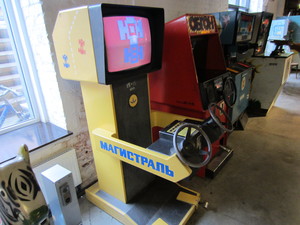 I had about six hours time in Moscow before entering my next train. A bit too much time for getting from one train station to another, eating and sitting around. So I looked for something to do while being in Moscow. I already visited the basic sights like the Red Square last time I was in Moscow, so I was looking for something more unusual.
I had about six hours time in Moscow before entering my next train. A bit too much time for getting from one train station to another, eating and sitting around. So I looked for something to do while being in Moscow. I already visited the basic sights like the Red Square last time I was in Moscow, so I was looking for something more unusual.I checked the Wikivoyage page of Moscow and one of the first things it mentions is the Museum of Soviet Arcade Machines. That sounded like it's worth a visit. I checked the location and it is quite centrally located, only a few minutes walk from the Metro station Baumanskaya. (If you exit the metro, you're already on Baumanskaya street and the Museum is in Baumanskaya street 11.)
As the name says, the museum features arcade machines from the soviet aera. You get a couple of real soviet 15 Kopek coins when entering that you can spend on playing. So I played some rounds of Magistral (Магистраль) - seems something like the soviet answer to Pacman - and others. Honestly, for many of the games I failed to understand how they were supposed to be played. What was interesting that there were a couple of "games" that featured non-virtual content. For example, there was a game where you could control a little toy tank called Tankodrom (танкодром), but I didn't really understand how to play that game either. Obviously there were quite a number of games with cold war references. The Museum also includes some tables where you can have a coffee after playing. If you ever happen to be in Saint-Petersburg, the museum has a branch there, too.
After that I went to Kazansky railway station where my next train was leaving. Moscow has several train stations and some of them are named after the countries where their international trains are heading. So for me that meant I entered Moscow at the Belorussky railway station (because I came through Belarus) and I left at Kazansky railway station (because I was heading to Kazakhstan). (someone in the comments told me this is wrong and Kazaksny station refers to the city Kazan - so I was probably wrong on this naming)
Pictures from the Museum of Soviet Arcade Machines in Moscow
Posted by Hanno Böck
in Computer culture, English, Life, Retro Games
at
16:45
| Comment (1)
| Trackbacks (0)
Defined tags for this entry: arcade, asia2013, computerhistory, magistral, moscow, museum, retro, retrogames, russia, tankodrom
Entering Russia and the migration card
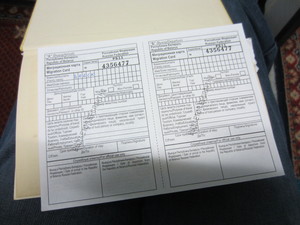
Russian migration card
The migration card is a double-form where you have to fill in some of your basic data. It's then stamped by the border guards and split in half. They keep one half, you get the other and keep it until you leave the country again. From what I've heard, one of the more troublesome things you can encounter is losing your migration card while in Russia.
There are some tricky things to know about the migration card. First: If you enter Russia through Belarus, you'll get only one migration card for both countries. That bothered me a lot on my last trip, because I only entered the data for Belarus, that means a stay of one day. Turned out this wasn't a big issue. When leaving Russia the border guards had a more closer look on the documents and obviously noticed the misinformation, but they didn't seem to care that much.
There seem to be similar issues with other countries. I even once got a migration card at the Ukrainian border, where I didn't want to enter Russia at all. It just happened that I was sitting in a train that was going to Russia after crossing the Ukraine. So if you ever happen to enter Russia through another country, although you don't necessarily get the migration card at the Russian border, you should enter the data for your stay in Russia.
Another thing I learned this time: There is a field for the Visa number. Now I obviously had two Visa - one for Belarus and one for Russia. I filed the number of the Russian one, because after all, I wanted to go to Russia and only cross Belarus on a train. Turned out I was wrong and the Belarus border guards complained. Admittedly, it can be a bit frightening if a border guard tells you something is wrong, especially if you don't understand their language. But after all, he just filled in the correct Visa number himself and everything was okay.
Kazakhstan also has a migration card, but it is not split in half and no similar pitfalls seem to occur there.
Friday, November 9. 2012
Languages and translation technology
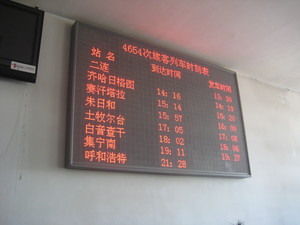 Just recently, Microsoft research has made some progress in developing a device to do live translations from English into Mandarin. I'd like to share some thoughts with you about that.
Just recently, Microsoft research has made some progress in developing a device to do live translations from English into Mandarin. I'd like to share some thoughts with you about that.If you read my blog on a regular basis, you will know that I traveled through Russia, Mongolia and China last year. If there's one big thing I learned on this trip, it's this: English language is - on a worldwide scale - much less prevalent than I thought. Call me a fool, but I just wasn't aware of that. I thought, okay, maybe many people won't understand English, but at least I'll always be able to find someone nearby who's able to translate. That just wasn't the case. I spent days in cities where I met nobody that shared any language knowledge with me.
I'm pretty sure that translation technologies will become really important in the not-so-distant future. For many people, they already are. I've learned about the opinions of swedish initiatives without any knowledge of swedish just by using Google translate. Google Chrome and the free variant Chromium show directly the option to send something through Google translate if it detects that it's not in your language (although that wasn't working with Mongolian when I was there last year). I was in hotels where the staff pointed me to their PC with an instance of Yandex translate or Baidu translate where I should type in my questions in English (Yandex is something like the russian Google, Baidu is something like the chinese Google). Despite all the shortcomings of today's translation services, people use them to circumvent language barriers.
Young people in those countries are often learning English today, but it's a matter of fact that this will only very slowly translate into a real change. Lots of barriers exist. Many countries have their own language and another language that's used as the "international communication language" that's not English. For example, you'll probably get along pretty well in most post-soviet countries with Russian, no matter if the countries have their own native language or not. This also happens in single countries with more than one language. People have their native language and learn the countries language as their first foreign language.
Some people think their language is especially important and this stops the adoption of English (France is especially known for that). Some people have the strange idea that supporting English language knowledge is equivalent to supporting US politics and therefore oppose it.
Yes, one can try to learn more languages (I'm trying it with Mandarin myself and if I'll ever feel I can try a fourth language it'll probably be Russian), but if you look on the world scale, it's a loosing battle. To get along worldwide, you'd probably have to learn at least five languages. If you are fluent in English, Mandarin, Russian, Arabic and Spanish, you're probably quite good, but I doubt there are many people on this planet able to do that. If you're one of them, you have my deepest respect (please leave a comment if you are).
If you'd pick two completely random people of the world population, it's quite likely that they don't share a common language.
I see no reason in principle why technology can't solve that. We're probably far away from a StarTrek-alike universal translator and sadly evolution hasn't brought us the Babelfish yet, but I'm pretty confident that we will see rapid improvements in this area and that will change a lot. This may sound somewhat pathetic, but I think this could be a crucial issue in fixing some of the big problems of our world - hate, racism, war. It's just plain simple: If you have friends in China, you're less likely to think that "the chinese people are bad" (I'm using this example because I feel this thought is especially prevalent amongst the left-alternative people who would never admit any racist thoughts - but that's probably a topic for a blog entry on its own). If you have friends in Iran, you're less likely to support your country fighting a war against Iran. But having friends requires being able to communicate with them. Being able to have friends without the necessity of a common language is a fascinating thought to me.
Posted by Hanno Böck
in Computer culture, English, Life
at
22:53
| Comments (0)
| Trackbacks (0)
Defined tags for this entry: babelfish, china, chinese, english, googletranslate, language, mandarin, russia, russian, translation, travel, universaltranslator
Sunday, July 17. 2011
Alternative routes through Kazakhstan
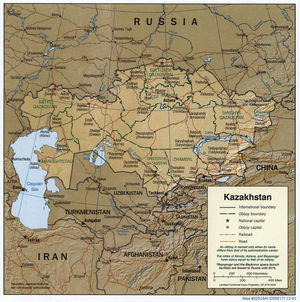 I have promised to write something about the route we had planned to take for the way back from China to Europe. We had several variants in mind, I'll list them all. All of them, however, have in common that they start in Ürümqi (乌鲁木齐, ئۈرۈمچی) - and as I already wrote, the train line to Ürümqi seems to be a bottleneck - it was booked out for an unknown amount of time.
I have promised to write something about the route we had planned to take for the way back from China to Europe. We had several variants in mind, I'll list them all. All of them, however, have in common that they start in Ürümqi (乌鲁木齐, ئۈرۈمچی) - and as I already wrote, the train line to Ürümqi seems to be a bottleneck - it was booked out for an unknown amount of time.Ürümqi is a town in the Uyghur province of China in the north-west. It is north of the Taklamakan desert. China's population is not evenly spread through the country. Most of the population lives in the eastern part. The west is sparsely populated and Ürümqi is one of the very few big cities in the west.
From Ürümqi, there are several options to go to Kazakhstan - there exist trains and busses both to Astana (Астана, أستانا), the current capital of Kazakhstan, and Almaty (Алматы, الماتى), the former capital.
Variant a: Twice through russia (our preferred option).
From Astana, there is a train directly to Kiev (Київ) in Ukraine. The train goes twice through russia. Once it scratches it before Oral / Uralsk (Орал). I think it doesn't even stop there. The other time it goes through the Caucasus region.
It should've been possible to buy the train ticket in Astana and then get a transit express visa in the russian consulate. I read some reports suggesting that EU people were able to do this. However, I was not entirely sure about that: Usually, a russian transit visa only allows to pass the country a single time. I don't know if crossing the country twice would've posed any problems.
Astana to Kiev is quite long - stopping was a problem, because you can only get the transit visa once you have the ticket for the whole journey. So our plan was to take the train just to Kharkiv (Харків) in the east of Ukraine. This would've limited the train trip to a bit more than two days. Still a lot, but acceptable for me.
Variant b: Once through russia.
Oral/Uralsk (Орал) in western Kazakhstan has its own russian embassy. As stated above, the train from Astana to Oral already crosses russia, but there's a way round: One can first take the train to Atyrau (Атырау) and then to Oral. This way, you don't leave Kazakhstan. The advantage: Lots of options to make stops, no overly long train trips.
The problem with this variant was that I had almost no information about the consulate in Oral: I haven't read a single report online that any EU citizen tried or successfully applied for a transit visa there. I only found some people asking that question, but without answers. So it was quite unsure if this would work.
Variant c: Avoiding russia altogether (option we originally intended to take).
It is also possible to avoid passing russia altogether. One can go by train to Atyrau (like in variant b), but then take a train on to Aktau (Ақтау) at the caspian see. From Aktau, there is a ferry service to Baku in Azerbaijan.
Now, this "ferry" has its own problems: It has no regular schedule. In fact, from what I read its no real ferry at all, but a cargo ship. It starts when there's enough cargo. So you have to get there and ask every day if there will be a ship today. Waiting times rank between some days and two weeks. I had liked to take that option, because I like travelling by ship and I thought that sounded like an interesting experience.
From Azerbaijan, one could take a train to Tbilis in Georgia and continue by bus to Istanbul in Turkey. From there, there is a train to Austria (the orient express sadly doesn't exist any more).
We had our visas ready for Kazakhstan and Azerbaijan. Georgia and Turkey are visa free for EU citizens.
If you look at a map, you may notice that there's another option: Going from Kazakhstan to Turkmenistan and Iran. However, that would've imposed getting two more visa plus the feeling that travelling through Iran might be a risk. So I haven't really investigated that option very much.
Posted by Hanno Böck
in English, Life
at
22:30
| Comments (0)
| Trackbacks (0)
Defined tags for this entry: asia, azerbaijan, caspian, china, ferry, kazakhstan, russia, travel, trip2011, visa
Friday, July 15. 2011
Visa
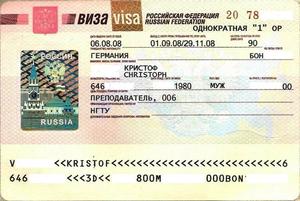 For our trip, we needed a couple of visa. I haven't applied myself for a visa any time before, so this was quite new to me. This was the most troublesome part of our travel preparations.
For our trip, we needed a couple of visa. I haven't applied myself for a visa any time before, so this was quite new to me. This was the most troublesome part of our travel preparations.What I learned about getting visa:
- Every country has different rules for visa.
- You cannot apply for several visa at once - they take your passport. That means you have to add all the waiting times and cannot apply for more than one at once (this may seem trivial if you know the procedure, but I didn't).
- The information on the consulates webpages is often incomplete or inaccurate. (For example, if you have a 30 day visa: Does that mean 30 days starting from your entry to the country? Or 30 days starting from a fixed date you have to know in advance? Pretty relevant if you plan your trip.)
- If you phone a consulate, they won't answer. If you email a consulate, they won't answer.
- You cannot expect that anyone in the consulate is able to speak to you in a language you understand.
- You cannot expect that information you got from people in the consulate is correct.
- Usually, the best way to get information is searching the internet for people who have done the same thing before. There are specialized companies that arrange your visa, but the information you get from them is also often inaccurate.
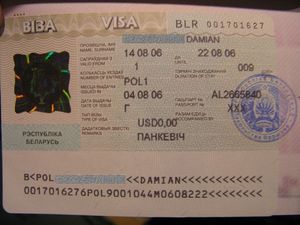 In the end, we applied for 6 different visa (Russia, Mongolia, Belarus, China, Kazakhstan, Azerbaijan), although we didn't use them all in the end (see previous blog entry).
In the end, we applied for 6 different visa (Russia, Mongolia, Belarus, China, Kazakhstan, Azerbaijan), although we didn't use them all in the end (see previous blog entry).The most difficult part was the russian one. That was, in the end, the reason we couldn't make the trip the way we wanted to (taking the transsiberian train for both directions with stops). They have a kind of bizzare regulation regarding invitations: You need an invitation to apply for a russian tourist visa. This has evolved a market for agencies that arrange invitations. That means you pay them that they do a fake booking in a hotel you will never see in reality and get an invitation from them.
Another anecdote: When asking for the "two-way"-problem in the embassy, they gave us a contact to a travel agency that will help us. This travel agency suggested we could get two passports and thus apply for two visa - that would've been illegal according to russian law. I had no intention in seeing a russian jail from inside, so I refused to choose that option.
You see, it's a pretty complex issue. But there's one thing one should mention, too: It's not the russian (or other countries) authorities that are to blame here. Russia is very willing to relax its visa rules. They even suggested several times to abbadon the visa requirement for EU citizens at all. They just have one requirement: The regulation should be relaxed for their citizens, too. Everything I've heared suggests that russians trying to get a visa for Germany and other EU countries face more difficulties than the other way round. It's the EU that is blocking here.
If you want visa regulations to be relaxed, you'd better not only blame other countries regulations. You should also ask how regulation is the other way round. Looking at the current political debate in the EU, I don't have much hope that the situation will improve soon.
(the pictures are from Wikimedia Commons here (Russia) and here (Belarus) and are public domain)
Posted by Hanno Böck
in English, Gentoo, Politics
at
22:56
| Comments (5)
| Trackbacks (0)
Defined tags for this entry: asia, azerbaijan, belarus, china, kazakhstan, mongolia, russia, travel, trip2011, visa
Wednesday, July 13. 2011
Unexpected difficulties on our trip
My Asia trip is over. I'll try to sum up some experiences I made.
In the end, we couldn't do a lot of things we had planned to do, especially for the China part of our trip. Due to a number of reasons, our approximate time plan completely didn't work. Sometimes this was due to a lack of information (e. g. not finding a ferry / a bus we've read about) and communication possibilities. A surprising problem was also the lack of internet information: It seems having a webpage is far less common in China, many transport operators, hotels or other venues had no internet presence at all, not even a chinese one.
Very time consuming were unplanned stops due to simple health problems like a cold.
I think I wrote that some times before, but I had never expected the difficulties with the language. The idea that English is some kind of "international communication language" is not very common in Russia and China - I think we stayed in a couple of cities where we didn't meet a single person we could talk to. I felt this was a great limitation for my possibilities to get to know those countries better.
Another unexpected difficulty was getting any medicine. I had thought that in any country in the world you should be able to get some equivalent medicine if you show the pharmacy personal the scientific name of the ingredient. This worked in Russia, but it didn't work in China - and I tried a lot of pharmacies. I suggest if you ever go to China, take everything you usually use to handle small issues like a cold or a headacke in large enough quantities.
In the preparation phase of the trip, I was often warned of safety issues like pickpocketing. This was almost a non-issue. Nothing was stolen from me and I don't remember even an attempt to do so, although we visited places like the Naran Tuul market in Ulaanbaatar, where everyone will tell you that pickpocketing is a big issue. I don't know if I was just lucky, but I had the feeling that using common sense and always looking after your belongings is enough to handle this.
In the end, we couldn't do a lot of things we had planned to do, especially for the China part of our trip. Due to a number of reasons, our approximate time plan completely didn't work. Sometimes this was due to a lack of information (e. g. not finding a ferry / a bus we've read about) and communication possibilities. A surprising problem was also the lack of internet information: It seems having a webpage is far less common in China, many transport operators, hotels or other venues had no internet presence at all, not even a chinese one.
Very time consuming were unplanned stops due to simple health problems like a cold.
I think I wrote that some times before, but I had never expected the difficulties with the language. The idea that English is some kind of "international communication language" is not very common in Russia and China - I think we stayed in a couple of cities where we didn't meet a single person we could talk to. I felt this was a great limitation for my possibilities to get to know those countries better.
Another unexpected difficulty was getting any medicine. I had thought that in any country in the world you should be able to get some equivalent medicine if you show the pharmacy personal the scientific name of the ingredient. This worked in Russia, but it didn't work in China - and I tried a lot of pharmacies. I suggest if you ever go to China, take everything you usually use to handle small issues like a cold or a headacke in large enough quantities.
In the preparation phase of the trip, I was often warned of safety issues like pickpocketing. This was almost a non-issue. Nothing was stolen from me and I don't remember even an attempt to do so, although we visited places like the Naran Tuul market in Ulaanbaatar, where everyone will tell you that pickpocketing is a big issue. I don't know if I was just lucky, but I had the feeling that using common sense and always looking after your belongings is enough to handle this.
Tuesday, July 12. 2011
Travelling without flying - how I failed
I haven't stepped into an airplane for about 12 years. I travelled a lot through Europe with ferries, trains, busses and hitchhiking. It was my plan to stick to that on this big trip.
It's a simple fact that there is no viable option to use airplanes on a regular basis in a responsible way. There is no thinkable way that all humans on this planet can have access to planes. It only works because it's a privilege of a rich minority. And there's no thinkable way of combating climate change with the current growth rate of the aviation industry - not to mention the dangers of Peak Oil and unconventional oil extraction.
Some environmentalists who like flying found a very creative way to circumwent this: Compensating emissions. You pay an amount of money that's invested in some climate project for every flight you do. If I had to name the three most ridiculous actions people invented in combating climate change, compensating flight emissions would certainly rank amongst them (for the other two I'd vote carrot mobs and lights off actions). As above, this only works for a very small minority of rich people.
Ok, so back to our trip. It was my plan to avoid flying. I wanted to proove myself and others that it's possible. I failed. I took a plane from Beijing back to Germany. For a relatively trivial reason: Our plan was to take a train to Urumqi, then go to Kazakhstan and then we had two options, one with a train through russia to Ukraine and one through the caspian see to Azerbaijan (I will describe those in detail in a later blog entry). All of them requried getting to Urumqi first. There's no alternative route with public transport. And here's the problem: All tickets to Urumqi were sold out - for the whole time they can be booked in advance. So we wouldn't get tickets for an unknown amount of time.
I the end, after checking all alternative options I could think of, I decided to take a plane back to Germany and shorten my trip. I wasn't that unhappy about it after all, because I experienced our trip much more exhausting than imagined.
There would've been one other option: Taking the transsiberian train back. But that imposes another difficulty that has to do with russias visa regulation. A russian tourist visa is valid for 30 days. So ours is expired. It is not possible to get two visa at the same time, so it was not possible to arrange this in advance (it was our original plan to go back through Russia). And it is not possible to get a russian tourist visa anywhere else than in your home country. It used to be possible in Hong Kong in the past, but recently russia has tightened its visa regulations and according to several online sources this is no longer the case. The only option is getting a Russian transit visa. But that means you have to do the whole trip in a row and have all the tickets to Moscow and further to another country ready beforehand. This means several days in a train without much possibility to pause. I decided that I'm not up for that. I already found the many long train trips we did very difficult, partly because I'm slightly claustrophobic. My girlfriend will do the train trip - I won't. If you are ever in the same situation and need a travel agency, I can suggest Monkey Shrine - they are quite expensive, but their service was excellent. They were able to arrange all tickets including ones from Moscow to Kiev or Tallin and offered a lot of different options for all parts of the trip.
Now I don't think that my single flight will change much. It was a symbolic thing. But I think that opening options for flightless travelling is essential and gets far too less attention. If people talk about environmental or sustainable tourism, the issue of aviation is rarely spoken about. Often enough the problem is just that it is never considered. Take the visa regulation: If you enter and leave a country with an airplane, you usually don't need any visa - even if you change the plane within the country. There's no comparable rule for trains. You even need a visa if you enter and leave a country in a train without a stop. If you're looking for organized transsiberian railway trips, almost all the time it's taking the train for one direction and the plane for the other. Different public transport options often don't fit very well together. I always illustrate this with an experience I had last year when I switched from the train in Zeebrugge in Belgium to the ferry to Edinburgh - there was not any proper footpath from the train to the ferry, although they were only some dozent meters apart. You had to either illegally cross the railway lines or walk on a big street without a footway. I think many missing links for travel options could be closed if there would be more people doing it (e. g. there is no ferry from Singapoure or other Asian countries to Australia and none between Russia and Alaska, although the way isn't that far).
These are just some unfinished thoughts, but I could imagine there is a need for a lobby for flightless travelling. There's much more one could write about it. Flightless travelling means slower travelling - which brings up a discussion about our relation to working time.
If you're interested in flightless travelling, the best online ressource I found is the great webpage seat61.
My trip ends here, but some more blog entries will follow with stuff I didn't find the time yet to write down.
It's a simple fact that there is no viable option to use airplanes on a regular basis in a responsible way. There is no thinkable way that all humans on this planet can have access to planes. It only works because it's a privilege of a rich minority. And there's no thinkable way of combating climate change with the current growth rate of the aviation industry - not to mention the dangers of Peak Oil and unconventional oil extraction.
Some environmentalists who like flying found a very creative way to circumwent this: Compensating emissions. You pay an amount of money that's invested in some climate project for every flight you do. If I had to name the three most ridiculous actions people invented in combating climate change, compensating flight emissions would certainly rank amongst them (for the other two I'd vote carrot mobs and lights off actions). As above, this only works for a very small minority of rich people.
Ok, so back to our trip. It was my plan to avoid flying. I wanted to proove myself and others that it's possible. I failed. I took a plane from Beijing back to Germany. For a relatively trivial reason: Our plan was to take a train to Urumqi, then go to Kazakhstan and then we had two options, one with a train through russia to Ukraine and one through the caspian see to Azerbaijan (I will describe those in detail in a later blog entry). All of them requried getting to Urumqi first. There's no alternative route with public transport. And here's the problem: All tickets to Urumqi were sold out - for the whole time they can be booked in advance. So we wouldn't get tickets for an unknown amount of time.
I the end, after checking all alternative options I could think of, I decided to take a plane back to Germany and shorten my trip. I wasn't that unhappy about it after all, because I experienced our trip much more exhausting than imagined.
There would've been one other option: Taking the transsiberian train back. But that imposes another difficulty that has to do with russias visa regulation. A russian tourist visa is valid for 30 days. So ours is expired. It is not possible to get two visa at the same time, so it was not possible to arrange this in advance (it was our original plan to go back through Russia). And it is not possible to get a russian tourist visa anywhere else than in your home country. It used to be possible in Hong Kong in the past, but recently russia has tightened its visa regulations and according to several online sources this is no longer the case. The only option is getting a Russian transit visa. But that means you have to do the whole trip in a row and have all the tickets to Moscow and further to another country ready beforehand. This means several days in a train without much possibility to pause. I decided that I'm not up for that. I already found the many long train trips we did very difficult, partly because I'm slightly claustrophobic. My girlfriend will do the train trip - I won't. If you are ever in the same situation and need a travel agency, I can suggest Monkey Shrine - they are quite expensive, but their service was excellent. They were able to arrange all tickets including ones from Moscow to Kiev or Tallin and offered a lot of different options for all parts of the trip.
Now I don't think that my single flight will change much. It was a symbolic thing. But I think that opening options for flightless travelling is essential and gets far too less attention. If people talk about environmental or sustainable tourism, the issue of aviation is rarely spoken about. Often enough the problem is just that it is never considered. Take the visa regulation: If you enter and leave a country with an airplane, you usually don't need any visa - even if you change the plane within the country. There's no comparable rule for trains. You even need a visa if you enter and leave a country in a train without a stop. If you're looking for organized transsiberian railway trips, almost all the time it's taking the train for one direction and the plane for the other. Different public transport options often don't fit very well together. I always illustrate this with an experience I had last year when I switched from the train in Zeebrugge in Belgium to the ferry to Edinburgh - there was not any proper footpath from the train to the ferry, although they were only some dozent meters apart. You had to either illegally cross the railway lines or walk on a big street without a footway. I think many missing links for travel options could be closed if there would be more people doing it (e. g. there is no ferry from Singapoure or other Asian countries to Australia and none between Russia and Alaska, although the way isn't that far).
These are just some unfinished thoughts, but I could imagine there is a need for a lobby for flightless travelling. There's much more one could write about it. Flightless travelling means slower travelling - which brings up a discussion about our relation to working time.
If you're interested in flightless travelling, the best online ressource I found is the great webpage seat61.
My trip ends here, but some more blog entries will follow with stuff I didn't find the time yet to write down.
Tuesday, July 5. 2011
Vegetarian food in asia
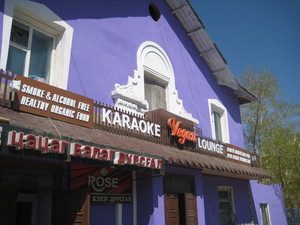 Being a vegetarian was a special challenge on our trip. It was difficult in Russia, where the food plan often enough was reduced to pizza margherita and pancakes. It was even more difficult in China, where the idea of having any food without meat seems to be widely unknown and the choice was often enough reduced to french fries from american fast food companies.
Being a vegetarian was a special challenge on our trip. It was difficult in Russia, where the food plan often enough was reduced to pizza margherita and pancakes. It was even more difficult in China, where the idea of having any food without meat seems to be widely unknown and the choice was often enough reduced to french fries from american fast food companies.But there was also a surprise: It was absolutely no problem in Mongolia - in sharp contrast to everything I've read before. Traditional mongolian food is very meat-oriented. But Ulaanbaatar has a density of vegetarian and vegan restaurants definitely higher than in Berlin. And even the little border town Zaamin-Üüd has a vegetarian café. Unlike one may expect, I never had the impression that they were primarily focussed to tourists. We even once were in a vegetarian restaurant in Ulaanbaatar that had only a mongolian menu without any english translation.
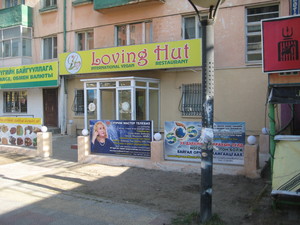 Most of those restaurants seem to be somewhat related to the "spiritual leader" Supreme Master Ching Hai. I don't know that much about her and her group, so I can't judge how problematic I find that (though I'm always sceptical both about leaders and about esoteric groups). Their arguments for veganism are mainly about the greenhouse gas emissions and climate change effects from meat productions, which is absolutely correct, but sadly their stated numbers are just wrong.
Most of those restaurants seem to be somewhat related to the "spiritual leader" Supreme Master Ching Hai. I don't know that much about her and her group, so I can't judge how problematic I find that (though I'm always sceptical both about leaders and about esoteric groups). Their arguments for veganism are mainly about the greenhouse gas emissions and climate change effects from meat productions, which is absolutely correct, but sadly their stated numbers are just wrong.
Posted by Hanno Böck
in Ecology, English, Life
at
10:27
| Comments (0)
| Trackbacks (0)
Defined tags for this entry: asia, china, chinghai, mongolia, russia, suprememaster, travel, trip2011, ulaanbaatar, vegan, vegetarian
Monday, May 30. 2011
Local public transport
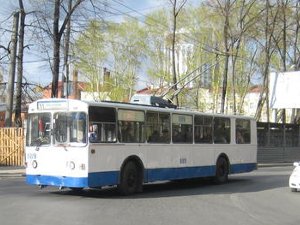 All russian cities we visited had a very well working public transport system. It consists of metros, trams, busses, trolleybusses and minibusses.
All russian cities we visited had a very well working public transport system. It consists of metros, trams, busses, trolleybusses and minibusses.On the metro, you pay for a coin (Yekaterinburg) or ticket (Moscow) before entering the area.
On Trams, you usually just get on the tram and there's a person where you can buy a ticket in the tram. It has a fixed price, which is usually between 10 and 20 rubels (about 0.25 to 0.50 €), if you need to switch the tram, you pay again. On busses, it's sometimes the same, if there's no person collecting ticket fees, you pay to the driver when leaving the bus. Same with trolleybusses and minibusses.
As long as you know which line to take, this is quite convenient. Usually, all lines come quite frequently, you only wait some minutes if you miss one. There was only one occasion where we had to take a taxi in Russia (to get the ferry to Port Baikal in time - the ferry itself worked like the trams, you pay on the ferry).
In Ulaanbaator, we found it a bit harder, mainly because we never really found out which bus to take (no tram or metro here). The ticket system is the same (you pay to a ticket seller on the bus). The busses here are often very overcrowded. Taxis here are really cheap, so that's what many people use.
Saturday, May 28. 2011
Bus from Ulan-Ude to Ulaanbaatar
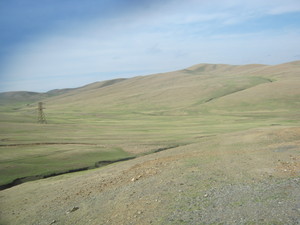 Ulan-Ude (Улан-Удэ) was our last stop in Russia, afterwards we took the bus to Ulaanbaatar (Улаанбаатар), the capital of Mongolia.
Ulan-Ude (Улан-Удэ) was our last stop in Russia, afterwards we took the bus to Ulaanbaatar (Улаанбаатар), the capital of Mongolia.I don't know why, but the mongolian part of the transsiberian railway is significantly more expensive than the russian part. The bus is a cheap alternative for the first part and it's also twice as fast (12 hours compared to 24 hours with the train). It costs 1000 rubels (about 25 €). We got the ticket through our hostel, so I can't tell where you can regularly buy it. (For the Mongolia-China part, there's also a cheap alternative, I'll write about that later.)
We started at 7 in the morning in Ulan-Ude. I'm usually a bit uncomfortable with long bus trips, especially if they go on curvy roads. Mongolia has nothing like motorways, so the whole ride goes on bumpy roads through the step.
Arriving at the russian-mongolian border, we had a bad feeling, because our migration card for russia was wrong. We got it at the border to Belarus and we didn't know that it's the migration card for both Belarus and Russia - so we only entered the dates and visa number for Belarus and realized that this was wrong when we entered Russia without a second border check. But it turned out our fear was unneccessary - the staff at the border called a colleague to look at the issue, but shortly afterwards we could go on without any more hassle.
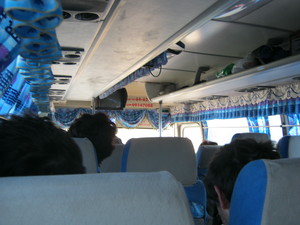 Right at the border, we already noticed that in Mongolia, english was much more common than in Russia. Unlike on the russian side, some of the mongolian border officers were able to speak english. After the border, we stopped at a restaurant for a while.
Right at the border, we already noticed that in Mongolia, english was much more common than in Russia. Unlike on the russian side, some of the mongolian border officers were able to speak english. After the border, we stopped at a restaurant for a while.Driving through the mongolian steppe, I felt that the main part of our journey really begins here: The landscape looked very different from everything I am used to and I found it quite exciting. Several times, the bus had to stop or horn for cows crossing the street.
In the evening, we arrived in Ulaanbaatar.
Pictures from Bus trip
Thursday, May 26. 2011
Ulan-Ude: Goodbye Lenin
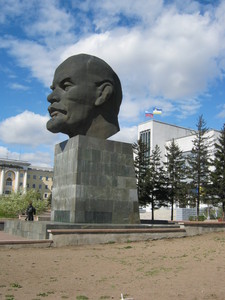 Ulan-Ude (Улан-Уд) is the city where the trans-Mongolian route of the transsiberian Train goes off the main route. Else, it's main sight is probably the big Lenin head statue, the biggest one in whole Russia.
Ulan-Ude (Улан-Уд) is the city where the trans-Mongolian route of the transsiberian Train goes off the main route. Else, it's main sight is probably the big Lenin head statue, the biggest one in whole Russia.Ulan-Ude is the capital of Buryatia. Buryats are people close to Mongolians, which one can easily see as many people look very different from most other russians.
We didn't do much there, except staying a night in a hostel and then leaving with a bus to Mongolia. So there is not much more to say about it.
Pictures from Ulan-Ude
Tuesday, May 24. 2011
Listwjanka and Port Baikal
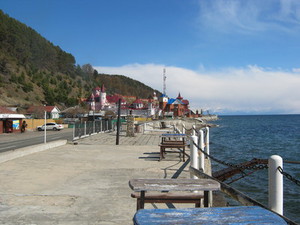 After being in Irkutsk, we headed on to lake Baikal. Although we heared that it's worthwile to visit the nature reserves in the north of the lake, we decided against it, as all options to get there would've involved quite long bus trips.
After being in Irkutsk, we headed on to lake Baikal. Although we heared that it's worthwile to visit the nature reserves in the north of the lake, we decided against it, as all options to get there would've involved quite long bus trips.Listwjanka (Листвянка) is a very tourist oriented village where the Angara River goes into lake Baikal. However, we were there completely out of season. I don't know if there was anyone else in the cheap Hotel we stayed, at least we saw noone else and the older couple running the Hotel seemed to be quite happy with having guests. This was the first time I stayed in a Hotel without any language communication possible.
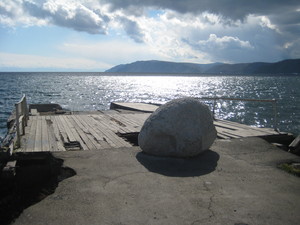 Listwjanka is connected with Port Baikal at the other side of the Angara with a ferry. Listwjanka is not very big, but it's spread several kilometers on the lake's shore. The ferry terminal was somewhat special. I wouldn't have noticed it as being in operation if I hadn't known exactly where it was. There was an old place to board the ferry where already some holes where in the ground and a big rock prevented any cars from getting on it. The ferry just boarded right beside that place. The timetable consisted of a piece of printed paper in plastic.
Listwjanka is connected with Port Baikal at the other side of the Angara with a ferry. Listwjanka is not very big, but it's spread several kilometers on the lake's shore. The ferry terminal was somewhat special. I wouldn't have noticed it as being in operation if I hadn't known exactly where it was. There was an old place to board the ferry where already some holes where in the ground and a big rock prevented any cars from getting on it. The ferry just boarded right beside that place. The timetable consisted of a piece of printed paper in plastic.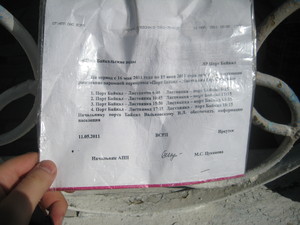 Port Baikal is really small. It wasn't even possible to get a coffee there, it only has some small shops (where we got some very good baked sweets). It is the starting point of the circum baikal railway line. We had to stay several hours, because the ferry only goes a few times a day. Port Baikal gave us a feeling of seeing Russian live in a small village. Some cows were just walking on the "streets" (no paved roads here). I assume Port Baikal has no water supply, as many people were getting water from a pump near the train station.
Port Baikal is really small. It wasn't even possible to get a coffee there, it only has some small shops (where we got some very good baked sweets). It is the starting point of the circum baikal railway line. We had to stay several hours, because the ferry only goes a few times a day. Port Baikal gave us a feeling of seeing Russian live in a small village. Some cows were just walking on the "streets" (no paved roads here). I assume Port Baikal has no water supply, as many people were getting water from a pump near the train station.Pictures from Listwjanka
Pictures from Port Baikal
Irkutsk
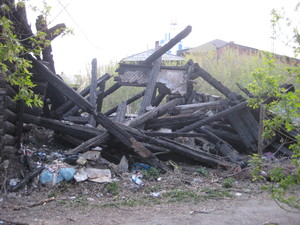 I'm still lagging behind a lot with blogging my trip. So I'll try to keep up a bit.
I'm still lagging behind a lot with blogging my trip. So I'll try to keep up a bit.After Yekaterinburg and a more than two day long train trip, we arrived in Irkutsk (Иркутck) near lake Baikal. Irkutsk is a much more tourist dominated city, which you suddenly notice by the larger number of english speaking people.
What I found noteworthy: At the beginning of our trip, I didn't see much of extreme poverty. This changed in Irkutsk. Large parts of the city are very small houses often in very bad shape. There are very rough breaks - in the same street, you see very modern buildings and a few meters further you see barracks. Also, there were a lot of burned down houses.
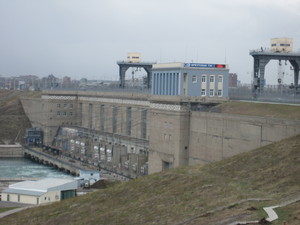 I took the opportunity in Irkutsk to visit the water power plant. It seems not many people consider it an interesting sight, as i was completely alone when I walked on and beside the dam.
I took the opportunity in Irkutsk to visit the water power plant. It seems not many people consider it an interesting sight, as i was completely alone when I walked on and beside the dam.A nice thing to visit was the market in Irkutsk, however, one should be prepared to be spoken to permanently by people trying to sell something to you.
After a short stay in Irkutsk, we went on to lake Baikal and the village Listvijanka (Листвянка).
Pictures from Irkutsk
Pictures from water power plant and dam in Irkutsk
Saturday, May 21. 2011
The Trans-Siberian Railway
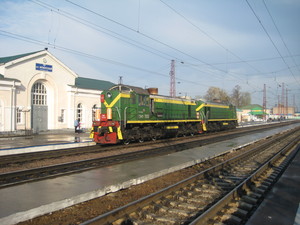 Large parts of our trip to Asia is on the famous Trans-Siberian Railway. It goes from St. Petersburg in the north-west of Russia to Vladivostok in the far south-east and has several sideways like the Trans-Mongolian line and the Trans-Mandshurian line to China. I started my Transsib-trip in Moscow and am currently in Ulan-Ude (Улан-Удэ).
Large parts of our trip to Asia is on the famous Trans-Siberian Railway. It goes from St. Petersburg in the north-west of Russia to Vladivostok in the far south-east and has several sideways like the Trans-Mongolian line and the Trans-Mandshurian line to China. I started my Transsib-trip in Moscow and am currently in Ulan-Ude (Улан-Удэ).Travelling in middle-Europe, one is usually not used to several-day long train tips. On our trip, we used only Platzkart (плацкарт), which is the 3rd and cheapest class which has a bed (on some parts you can get seat only tickets, which are even cheaper, but we always travelled over night, so this was no suitable option). Platzkart means that you're not travelling in small compartments, the whole carriage is one compartment with several beds in it. Although we read in several travelling guides that it's an uncommon option for European travellers, we found it quite satisfying.
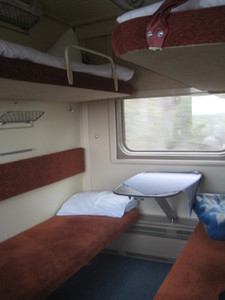 Every carriage has usually two train conductors. Something common on russian trains is that you can always get hot water to make tea or packet soup. I read in advance that there are a lot of food facilities on the stations, but this turned out to be much less of an option than thought. There are usually only small kiosks which all have more or less the same offerings.
Every carriage has usually two train conductors. Something common on russian trains is that you can always get hot water to make tea or packet soup. I read in advance that there are a lot of food facilities on the stations, but this turned out to be much less of an option than thought. There are usually only small kiosks which all have more or less the same offerings.Our longest train-trip was from Yekaterinburg to Irkutsk, which took us more than two days. It was very exhausting and we plan to avoid any more train trips longer than 24 hours for the rest of our journey. We also had some unpleasant experiences with drunken fellow passengers.
Pictures from Train Yekaterinburg - Irkutsk
Update: What I forgot to mention that's very noteworthy: On our trip, the transsiberian train was always very sharp on its schedule, at maximum it was only minutes behind. Very remarkable for several day long train trips.
Monday, May 16. 2011
Yekaterinburg
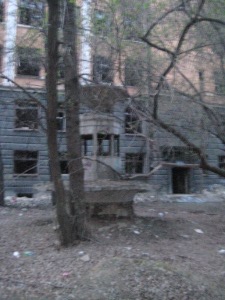 I am a bit behind with blogging my trip - not enough time, and if there's enough time, theres often not enough electricity or internet.
I am a bit behind with blogging my trip - not enough time, and if there's enough time, theres often not enough electricity or internet.We stayed for two days in Yekaterinburg (Екатеринбу́рг), which is the first big asian city if you travel from Europe to Russia. Yekaterinburg is probably a place where international visitors rarely drop by.
We stayed at two couchsurfers who operate a vegetarian shop in an area where vegetarism is barely known at all. So if you are ever in Yekaterinburg and need some tofu or soy milk, be sure to visit their shop.
The most relevant and unpleasant event during our stay was our attempt to get a ticket for our further route. I first thought that this wouldn't be a big issue, as we can order online tickets. But, as I already mentioned before, this is not an option here. For reasons unknown to me, this only works if you board the train at its starting point. So we went to the train station to try to get a ticket. Without much knowledge of Russian language, this was a really tough task and took us several hours. We wrote down the train we wanted to take and some Russian sentences we took from a travel guide. We were sent from one counter to the other, several times the ticket counter closed or made a "15 minute" pause (which in fact were more like 45 minutes) just in front of us. All in all I don't really know when we started this, so I don't know how long it took, but after all, we had the tickets we wanted in our hands - and they were significantly cheaper than any online offer we saw.
 Beside the ticket buying, which took us half a day and limited the time we had to see the city, some interesting places worth mentioning:
Beside the ticket buying, which took us half a day and limited the time we had to see the city, some interesting places worth mentioning:- Yekaterinburg has a very geekish sight: A keyboard monument (some websites like Wikitravel call it the QWERTY monument, but I don't know if that's its official name) - a big keyboard made of stones (map link).
- We were shown an old hospital that was closed about 10 years ago and is now a place where adventurous people do urban exploration and locals tell horror stories about hidden subfloors. Most of the building is in very bad shape and some fountains around it give it a very special atmosphere. A small part of the building however is still operational (I don't know the exact place, but it must be around here).
A common thing to see in Yekaterinburg are trolley busses - busses that uses overhead wires.
What I experienced the first time here was a kind of real-world spam that seems to be common in Russia: In the pedestrian area, many shops used sound systems for advertisement. So you hear a lot of music and loudspeakers telling you the latest cheap offers all the time. Very disturbing.
We've continued our trip to Irkutsk, but I'll write about that later.
Pictures from Yekaterinburg
(Page 1 of 2, totaling 17 entries)
» next page